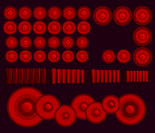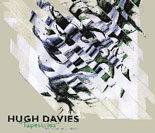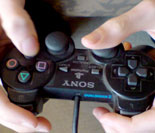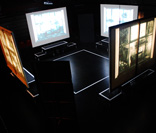Links within this page: Research themes | Recent students | Current students
Congratulations to Liliya Korallo who is the latest research student to be awarded her PhD. Find out about her project here.
Research students in the Lansdown Centre develop innovative work in both practical and theoretical forms.
We welcome applications for MPhil/PhD study from designers, artists, computer scientists, social scientists, and many others.
Some research themes
For general information on application see University page.
- We are currently particularly interested in applications within these fields, but this is not an exclusive list:
- locative media: see for example this BBC project and this Wellcome Trust project.
- educational applications of technology, especially locative technologies (for details please contact Magnus Moar)
- spatial and located audio: see for example this project and this project.
- access by older users (65 years plus) to media technologies and/or social networks (for details please contact Stephen Boyd Davis)
- history, theory, aesthetics, analysis of electroacoustic music with particular reference to the music and works of the Groupe de Recherches Musicales (for details please contact John Dack)
- theory, aesthetics, analysis of contemporary music with particular reference to serial thought (for details please contact John Dack)
- ‘open’ forms in music, media arts (for details please contact John Dack)
- stochastic approaches to music (for details please contact Gordon Davies)
- novel applications of eye-tracking (for details please contact Gordon Davies)
- interactive visual representations of historical time, such as timelines (see this blog (external site); for details please contact Stephen Boyd Davis)
- visual narrative and interaction (for details please contact Helen Bendon)
- the John Lansdown archive. The university owns archive material for this pioneer of computer art, design and choreography. This makes ideal material for a historical or analytical PhD based on original materials. For details please contact Stephen Boyd Davis.
- *note that you are welcome to propose a research theme of your own*
Our strengths include expertise in evaluative techniques/user studies and the situation of practice in its historic / social / philosophical context.

If in doubt, propose your research idea and we will discuss it with you. You are very welcome to email the Head of Centre, Stephen Boyd Davis. If our Centre is not the right place for your research, we will try to advise you anyway. You can find out more about the various research opportunities here.
- Recent students:
- Laurent Cozic, Sama'a al Hashimi, Ralf Nuhn, Rebecca Sinker, Anna-Marjatta Milsom, Chun Lee, Liliya Korallo.
- Current students:
- Gerrit Böhm, Martin Knöll, Charles Matthews, Dimitrios Sarakatsianos, Penda Tomlinson, Fiorenzo Palermo, Marianne Markowski, Paula Varanda, Sophie Mobbs, Wajid Yaseen
Recent research students
Laurent Cozic: Automated Cinematography for Videogames

Laurent researched solutions to a fascinating problem. One hundred years of cinematography have given us a rich vocabulary of techniques for narrative film-making, but videogames rarely benefit from this because they must prioritise interaction. How can the expressive possibilities of film be exploited without undermining gameplay and interactivity? In commercial games development this problem is partly solved by using scripts written for each space in the game. Laurent instead developed a camera system which automatically constructs good shots – even if the player does something unexpected. Laurent undertakes a wide range of freelance programming and software design work. His Director of Studies was Dr. Stephen Boyd Davis.
Download Laurent’s MPhil dissertation (PDF file 1.6Mb)
Sama'a al Hashimi: Paralinguistic Vocal Control of Interactive Media

Talking to a an interactive tree
Sama'a explored Non-Speech Voice Input in the User’s Experience of Multimedia. Users’ vocal utterances can be detected by microphones, and computer software can be used to extract words – and ultimately some aspects of their meaning – from the voice signal. This is the function of speech recognition. However, there are also paralinguistic aspects to vocal utterance – characteristics which may hold information, but without requiring access to the verbal content. Sama’a’s research combined a series of playful projects and theoretical investigation to explore how this aspect of speech could be used in interacting with systems of many kinds. Sama'a teaches at the University of Bahrain. Her Director of Studies was Gordon Davies. Other supervisors were Dr. Stephen Boyd Davis and Dr. Magnus Moar.
Download Sama'a’s PhD dissertation (PDF file 3.1Mb)
Ralf Nuhn: UNCAGED: A novel, ‘telesymbiotic’ approach to bridge the divide between the physical world and the virtual world of computers?

Ralf’s thesis complemented his project UNCAGED, which sought to ‘uncage’ screen-based realities from the confines of their digital existence and to bring the remote computer world closer to our human experience, offering a novel way to bridge the divide between the physical world and the virtual world of computers. The theoretical framework included a study of audience behaviour with UNCAGED at a major London museum and a critical evaluation informed by Baudrillard’s conception of the ‘real’ and the ‘virtual’. Ralf is currently a Research Fellow at the Lansdown Centre. His Director of Studies was Dr. John Dack.
Download Ralf’s PhD dissertation (PDF file 1.8Mb)

Rebecca’s research question was: To What Extent is the Internet an Appropriate Medium for Learning Through and About Contemporary Visual Art? This was investigated through a combination of theoretical work and a practical project: DARE, or the Digital Art Resource for Education. Rebecca demonstrated that when the internet is used to deliver art to school children, generally it simply reinforces the traditional canons – usually white and eurocentric – of historical art practice. Rebecca explored instead how the internet can be used for the teaching and understanding of culturally diverse contemporary art. The project was undertaken in connection with INIVA, the international institute for visual arts. Rebecca is now Head of Young People’s Programmes at the Tate Gallery. Her Director of Studies was Dr. Stephen Boyd Davis.
Download Rebecca’s PhD dissertation (PDF file 3.5Mb)
Chun Lee: Open Source Software within the Context of Contemporary Digital Arts

Chun Lee’s research examines the impact of free and open source software (FLOSS) within the context of contemporary digital arts. FLOSS has been widely embraced by digital artists as its greater flexibility encourages the creation of works. In addition, the ideological foundations of FLOSS, with its emphasis on collaboration and the sharing of code without restrictions, is symptomatic of the ethos shared by many contemporary digital artists. Chun Lee’s research documents the use of FLOSS in specific works as well as developing an original FLOSS project: DesireData. DesireData enhances Pure Data with a user-friendly interface. By server modification, client infrastructure and client reimplementation it also aims to increase the functionality of Pure Data and assist the artist to reduce the size of the source code. Chun passed his PhD viva on 18th February 2008 and in September 2008 the minor amendments to the thesis were approved by the examiners. His Director of Studies was Dr. John Dack.
He took the Centre’s MA Sonic Arts in 2002 – for which he got a merit – and before that completed the BA (Hons) Recording Arts – for which he got a first – from SAE Institute. Since that time SAE Institute have become our partners in a Skillset Academy.
Download Chun’s PhD dissertation (PDF file 2.1Mb)
Anna-Marjatta Milsom (PhD student in Translation Studies): Picturing Voices, Writing Thickness

Some of Lydia Cabrera’s many notebooks: materials for Anna’s research
Anna worked between two departments: Translation Studies (where her PhD was based) and the Lansdown Centre. Her research concentrated on translating the ‘ethnographic fiction’ of Cuban writer Lydia Cabrera. Tracing the connections that run between Cabrera’s field notes and her published folk tales led Anna to focus on voice and representation and ultimately to reconsider the format of the project itself. The resulting interactive artefact allows the reader to find her own route through a presentation of written, aural, and visual material. All the participants in the tales thus become visible; Cabrera, her informants, their ancestors and gods, the translator, and the reader.
Anna is a Senior Lecturer in Applied Translation at London Metropolitan University. Her director of studies at Middlesex University was Professor Kirsten Malmkjær. Her supervisor within the Lansdown Centre was Gordon Davies, himself a linguist and an expert in the design of interactive media. Her third supervisor was Francisco Dominguez. She completed her PhD in September 2008.
Download Anna’s PhD dissertation (PDF file 1.8Mb)
Liliya Korallo (PhD student in Psychology): Can virtual environments enhance the learning of historical chronology?

A prototype virtual environment of historical time
Liliya works between two departments: Psychology (where her PhD is based) and the Lansdown Centre. She is researching the uses of Virtual Reality in learning historical chronology: prior research has shown that children are often remarkably bad at grasping the sequence of events in history and the scale of historic time. With a small amount of seedcorn funding from the University (£10,000) a project was started to investigate how virtual environment technologies might help. Liliya trialled different forms of visual and interactive presentation in schools. This, combined with other work, has led to the publication of a joint paper in the journal Instructional Science, ‘Can virtual environments enhance the learning of historical chronology?’ and to the grant of a £70,000 Leverhulme award which is supporting Liliya’s PhD.
Liliya’s Director of Studies in Psychology is Professor Nigel Foreman. She is supported in the Lansdown Centre by Dr. Stephen Boyd Davis and Dr. Magnus Moar.
Current research students
- Current students:
- Gerrit Böhm, Martin Knöll, Charles Matthews, Dimitrios Sarakatsianos, Penda Tomlinson, Fiorenzo Palermo, Marianne Markowski, Paula Varanda, Sophie Mobbs, Wajid Yaseen, Gwen Fereday
Gerrit Böhm: Wayguiding: Interactive Guidance for Pedestrians at Key Points of Conflict

In situ guidance in Tokyo
Gerrit’s research is concerned with designing interactive guidance and augmented support for pedestrians in difficult situations in physical environments. The emphasis of the project is on the use of persuasive, responsive interactive cues, embedded into the environment, to provide pedestrians with subtle decision making and execution information in order to alter their walking behaviour. His Director of Studies is Dr. Magnus Moar.
Martin Knöll: Pervasive Games for Urban Health

Martin at work in the Olgahospital, Stuttgart
Martin is a guest PhD student at the Lansdown Centre, supervised by Prof. Dr. phil. Gerd de Bruyn at his home university, University of Stuttgart. He is researching the potential of serious game applications to support healthy living. This involves investigating the development of the relationship between cities and health as well as prospective users of these services: ‘the medical players’. At the Lansdown Centre, Martin is supervised by Dr. Magnus Moar.
Marianne Markowski: Designing Social Media for Older Users

Ivy Bean, 104-year-old Twitterer. Image from CNN.
Marianne began her PhD research in January 2008, investigating older users’ engagement with media and information technologies. The emphasis of the work is on the contribution that design can make to the acceptability and enjoyability of social media for older users. Marianne has several years’ experience working in usability and accessibility. She graduated from the Centre’s MA Design for Interactive Media in 1999. Her Director of Studies is Dr. Stephen Boyd Davis.
Charles Matthews: Adapting Gamelan for Algorithmic and Electroacoustic Music

Charles is investigating theory from traditional central Javanese music in the context of electroacoustic composition and performance. Gamelan features a unique approach to musical time, as a central melodic framework is typically expanded several times in the course of a performance, allowing certain players to fill in and interact as more space becomes available.
The research focusses on algorithmic representation of the relationships between core melodic and “elaborating” instrumentation across different ratios of rhythmic density and how such a system may be adapted to integrate sound synthesis and processing. His Director of Studies is Dr. Nye Parry.
Fiorenzo Palermo: the British Experimental Music Scene of the 1960s and 1970s

This research was inspired by the work of our late colleague Hugh Davies. Fiorenzo writes: ‘I have decided to pursue this goal driven by my love for the originality and eccentricity with which artists in this country have produced music. Above all, Hugh Davies who was my teacher at Middlesex University, who also made me value the freedom and purity of expression that certain avant-gardism allows.’ Fiorenzo is working at the British Library where Hugh’s collection is now held. His Director of Studies is Dr. John Dack.
Dimitrios Sarakatsianos: Cinematic Devices and Cognitive Assumptions

Using the Centre’s eye-tracker
Dimitirios is using eye-tracking to investigate how we watch films, concentrating on how our eyes respond to shifts in focus in the depth of the scene – a common rhetorical device that directors use to shift the viewer’s attention. Little work has been done so far on these perceptual-cognitive aspects of film viewing. In the course of the research, Dimitirios is discovering new ways of analysing the eye-tracking data. His Director of Studies is Dr. Stephen Boyd Davis.
Penda Tomlinson: Save Games – Exploration, Reflection and Cheating

The research investigates a neglected area in videogames. The save feature is a common element, recording the current game state so that players need not – for example – fear death because they can always travel back to before the fatal moment and make different choices. By implementing and examining various possible save game features, the research will uncover some important principles including the best save methods for particular games and genres. His Director of Studies is Dr. Magnus Moar.
Paula Varanda: Choreography for the Web

Paula began her PhD research in October 2008. Paula is looking at dance pieces conceived for web page format and to be accessed by personal computers, in order to examine what remains of performance when live becomes virtual and is presented in domestic space. The research will assess whether this is a new way of making dance or just a matter of transfer to a new medium, and if the present technological and cultural context favours contemporary dance to develop in web site stages within the professional standards of artistic practice. Her Director of Studies is Dr. Stephen Boyd Davis; her other supervisor is Prof. Chris Bannerman of ResCen; Nic Sandiland is advisor. Paula’s research is supported by Fundação para a Ciência e a Tecnologia, Portugal.
Sophie Mobbs (member of staff in Animation): Body Language in Animation

Sophie is investigating Body Language within the context of Animation, the point where it touches more deeply and subtly on the human psyche and our own evolved human responses to body-language and non-verbal communication. By studying this within a critical context, she hopes to find ways in which body language can be used to imply layers of sophistication of meaning within an animation, in particular animations that might be visually unrealistic and simply rendered but are convincing and believable to the viewer through their body language.

Wajid’s research will be exploring notions of embodiment within the context of immersive sound installations. He has previously directed a diverse range of projects ranging from the acclaimed 'Ear Cinema' project to the infamous destructivist event 'Scrapclub'. He graduated from the Centre’s MA Sonic Arts in 2008 and his Director of Studies is Dr. Nye Parry. He is supported by a Middlesex University studentship.
Gwen Fereday (member of staff in Textiles): Synaesthesia and Colour

The condition synaesthesia is one in which information that is normally processed separately in the brain is manifested simultaneously, producing visual and haptic sensations concurrently. Colours can have sounds attributed to them and texts may have colours. This latter – grapheme-colour synaesthesia – is the focus of Gwen Fereday’s research. Taking a practice-led approach, she is transforming and translating what people say they see in their ‘minds eye’, into something physical that can be seen and touched, using textiles as the medium because of their richness and versatility. Utilising her dyeing and weaving skills, Gwen will develop a tactile colour archive reflecting the distinctive vision of synaesthesia. Based on this, a series of textile artworks will be created. The research is expected to produce insights into synaesthetic sensitivities, and perhaps colour terms and colour models, as well as creating disctinctive visual work.
